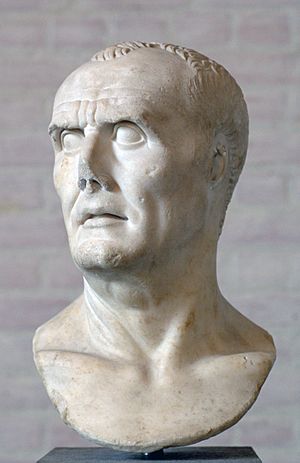Lucius Cornelius Scipio Asiaticus facts for kids
Lucius Cornelius Scipio Asiaticus was an important Roman general and leader who lived a long time ago, around the 3rd and 2nd centuries BC. He was the younger brother of the famous Scipio Africanus, who was a huge hero in Rome.
Lucius became a consul (a top leader) in 190 BC. Later that year, he led the Roman army, along with his brother, to a big victory at the Battle of Magnesia. This battle was against a powerful king named Antiochus. Even though his brother was more famous, Lucius had a very interesting life and career.
Contents
Who Was Lucius's Family?
Lucius belonged to a very important Roman family called the gens Cornelia. This family had more leaders (consuls) than almost any other in ancient Rome. His father was Publius Cornelius Scipio, who was a consul in 218 BC. Sadly, his father died fighting the Carthaginians in 211 BC.
Lucius's mother was Pomponia. His older brother was Scipio Africanus, who was known for defeating Hannibal at the Battle of Zama in 202 BC. Lucius and his brother were very close throughout their lives. Lucius also had a cousin, Scipio Nasica, who was born around the same time. They often competed for the same political jobs as they grew up. We don't know who Lucius's wife was.
Lucius's Early Career
Lucius started his career serving in the army under his brother. This was during the Second Punic War in Spain. He even won a famous duel against a Carthaginian commander! In 208 BC, he captured a town by himself.
In 206 BC, Lucius was sent to the Roman Senate (the main governing body) to share the good news about a big Roman victory in Spain. He held several important political jobs:
- He was a curule aedile in 195 BC. This job involved managing public games and city services.
- He became a praetor (a high-ranking judge or governor) in Sicily in 193 BC. His brother's influence helped him get this position.
He tried to become a consul in 191 BC but lost to his cousin, Publius Cornelius Scipio Nasica.
Becoming a Consul and a Great Victory
Lucius was finally elected consul in 190 BC. His co-consul was Gaius Laelius, who had been his brother's second-in-command. Some people in the Senate didn't have much faith in Lucius's abilities. However, his brother, Scipio Africanus, offered to go with him as an assistant. This made the Senate agree to give Lucius command of the war in Greece against King Antiochus.
Lucius showed his strength by not agreeing to a peace deal that his brother had made with some Greek groups. But his brother made sure that Lucius received all the credit for the huge victory over Antiochus at the Battle of Magnesia. When Lucius returned to Rome in 189 BC, he celebrated a grand parade called a triumph. He also asked for the special title "Asiaticus" to show that he had conquered parts of Western Asia Minor.
Lucius's Later Challenges
Later in his life, Lucius faced some problems. He was accused of taking some of the money that Rome had collected from King Antiochus. His brother, Scipio Africanus, was very angry about these accusations. In a bold move, his brother even tore up the financial records of the war while speaking in the Senate!
After his brother died around 183 BC, Lucius was put in prison because of the accusations of misusing money. However, a leader called Tiberius Gracchus later pardoned him. Lucius was still forced to sell his property and pay a large sum of money to the state. Roman historians say that he refused to accept any gifts or loans from his friends to help him pay the penalty. This shows his strong character.
In 184 BC, Lucius tried to become a censor (a powerful official who oversaw public morals and finances). But he was defeated by M. Porcius Cato, who was an old enemy of his family. Cato even took away Lucius's special public horse, which was a sign of his status as a Roman knight.
Lucius's Descendants
Lucius Cornelius Scipio Asiaticus had children and grandchildren. They were known as the Cornelii Scipiones Asiatici. The last known descendant with this name was Lucius Cornelius Scipio Asiaticus, who was a consul in 83 BC.
See also
 In Spanish: Lucio Cornelio Escipión Asiático para niños
In Spanish: Lucio Cornelio Escipión Asiático para niños
- Scipio-Paullus-Gracchus family tree
 | John T. Biggers |
 | Thomas Blackshear |
 | Mark Bradford |
 | Beverly Buchanan |


